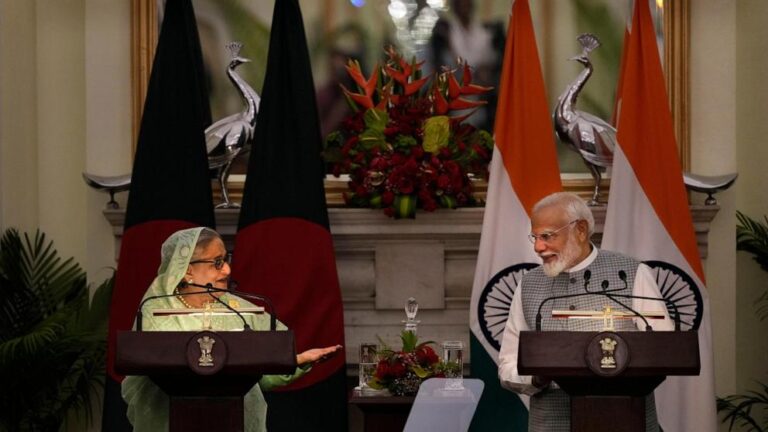India and Bangladesh moved to strengthen defence ties on Saturday, signing agreements to expand cooperation in maritime security, maritime economy, space and communications as India seeks to project itself as a regional partner.
NEW DELHI — India and Bangladesh moved Saturday to strengthen defense ties, signing agreements to expand cooperation in maritime security, maritime economy, space and communications as India seeks to present itself as a regional power and a counterweight to China.
The agreement was signed during Bangladesh Prime Minister Sheikh Hasina’s visit to India, becoming the first foreign leader to visit New Delhi since Narendra Modi was sworn in for a third term as prime minister two weeks ago.
Modi welcomed Bangladesh’s decision to join the Indo-Pacific Maritime Initiative to expand and foster regional cooperation among India’s maritime neighbours. He said the agreement with Dhaka is part of India’s pursuit of a Neighbourhood First policy.
Bangladesh also enjoys good relations with China, its main trading partner, mainly for raw materials. But maintaining close ties with Beijing is difficult for Bangladesh, which has to balance diplomatic and trade ties with India and the United States, China’s main rivals.
Bangladesh’s garment industry earns more than 80 percent of its foreign currency from exports and is heavily dependent on China for raw materials.
Prime Minister Hasina told reporters in New Delhi that the two countries had decided to share river waters and strengthen cooperation in the power and energy sectors.
She also met Indian industry leaders and encouraged them to invest in Bangladesh, which plans to develop larger ports, waterways, rail and road networks. India has lent $8 billion to Bangladesh over the past eight years to help expand its infrastructure.
Since Prime Minister Sheikh Hasina’s Awami League party came to power in 2009, she has acted to address the Indian government’s concerns that Indian militant groups were finding shelter in Bangladesh.
However, no agreement has yet been reached on sharing the waters of the Tista River. The issue of illegal migration from Bangladesh to India has also plagued bilateral relations for many years.
India is Bangladesh’s largest export destination in Asia. Trade between the two countries is expected to reach $15.9 billion in 2022-23.
New Delhi mainly exports cotton, automobiles, sugar, steel, aluminium, electrical and electronic equipment to Bangladesh, while it imports grains, paper and board pulp, cement and raw hides.

